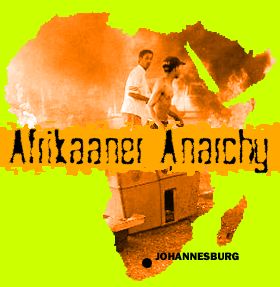
Every morning I unbolt the heavy door of my bedroom," says computer programmer Bruce Hackett. "I walk down the hall, I unbolt another massive door and a huge metal gate behind it. I'm in the kitchen now -- to get outside I pass through another 3-inch thick door and another metal security gate. In the driveway, I'm surrounded by an 8-foot cement wall with a 4-foot electrified razor-wire fence on top of that. It seems impenetrable, but last week someone scaled it and stole my car radio...
"I get in my BMW, I drive through a pin-coded electronic gate into the street. I want to visit a friend, but I'm afraid to drive through downtown. So I loop, instead, around the periphery of the city through safer neighborhoods -- this takes three times longer. I'm nervous anyway, at every traffic light -- I'm fearful of car-jackings. I have flamethrowing 'Blasters' installed by both my front doors; they shoot man-sized fireballs to torch approaching criminals -- this should make me feel secure, but it doesn't..."
The elaborate defense system described above isn't narrated by a paranoid in an apocalyptic sci-fi epic -- it's just the "normal" routine of many residents in Johannesburg, South Africa. The violent Transvaal metropolis of 6 million has been assaulted by crime ever since its gold-rushing birth in 1886; today it's so relentlessly scary, it makes Detroit look like a sissy.
Every day, 20 people are murdered in "Jo'burg" -- this homicidal digit surpasses every cesspit's stat on the planet except Medellin, the drug-doomed Colombian hole. Jo'burg's rape and gang-rape rate is also appalling and frequently deadly: Superstition claims that sex with a virgin cures AIDS (one-eighth of the population is infected). Car-jackings torment 210 people a week; kidnapping and robbery are common. Even its white-collar crime (check and document fraud, counterfeit bills and stamps) ranks third in the world, behind Moscow and Medellin.
Perhaps the most chilling statistic is that 66 percent of Jo'burg's residents have been victimized. Crime bites everyone: both wealthy whites (a man was tortured with a hot clothes iron for hours by three Zulu burglars demanding access to his safe), and dirt-poor blacks in shanty Soweto (a woman's 21st birthday was interrupted by bandits, who killed her mother, raped her, and pillaged their house).
Jo'burg's bad behavior can be primarily blamed on five culprits:
GUNS: Arsenals of cheap AK-47s (only $6 each!) are abundant, spawned by decades of anti-apartheid struggle. Teens want to blast? They can buy their own bangers, when they turn sweet 16. Blind bureaucracy also contributes -- a recent investigation revealed that 20,000 South African ex-criminals still possessed firearm licenses.
POVERTY: Thirty to forty percent of Johannesburg's black population is unemployed, and 65 percent of poor Soweto's 1.2 million are jobless. Meanwhile, opulent white neighborhoods like Parktown, Melville, and Sandton enjoy leafy parks, glittering malls, and colonial mansions. Obviously tempting.
WILD CHILDREN: A report in the African Security Review notes that "the coming decades are likely to witness an increase in the crime rate" due to massive multiplication of the orphan population, caused by parents succumbing to AIDS.
CORRUPT, COWARDLY COPS: Criminals often escape detention by simply strolling out of poorly-guarded compounds (34,000 flew the coop from 1994-1997). Foot patrolmen are extinct, and patrol cars are vanishing. If a suspect is arrested, the conviction rate's only a measly 30 percent. Why? A gangster interviewed by CNN claimed it was easy to "buy the investigating officer..."
GANGSTERS: Security experts believe nearly 400 crime syndicates will exist in South Africa by Y2K; the nastiest will feast on Jo'burg's huge, struggling flesh. Many gang members are ex-guerrillas of the freedom-fighting Umkonto we Sizwe (MK) -- when apartheid collapsed, they decided wages were superior on the wrong side of the law. They utilize their military expertise to rob banks, kill foes, and hijack vehicles.
Can Jo'burg be saved? Will this "city of gold" be eternally mugged? Cures are proposed, but they're generally distasteful, or unlikely:
MEDIEVAL DISMEMBERMENT: Bishop Stanley Mogoba of the Pan African Congress has demanded the amputation of evildoers' body parts. "We must look to a language that criminals understand!" he insists.
VIGILANTE JUSTICE: Professional tough guys are often employed by threatened communities, to do the dirty work the police are inept at. Their tactics are brutal; PAGAD (People Against Gangsterism and Drugs) recently burned a known drug dealer, in front of a cheering crowd.
GOVERNMENT ACTION: Former President Nelson Mandela usually derided the crime stats, claiming they were just false propaganda disseminated by his political rivals. When pressed, he blamed all disorders on poverty caused by apartheid's residue. Opponents of his National Congress Party (ANC) promised to increase the police budget if they were handed the administrative reins, but since ANC members took June's elections by a landslide, that promise amounts to precisely nothing.
Johannesburg desperately needs foreign investment and tourism, but neither will root in the current atmosphere of fear. Visitors' are all-too-often horrified, like the Lebanese Ambassador who recently fled after his home was repeatedly, mercilessly burglarized. Packing up the remnants, he bitterly announced that war-scarred "Beirut, even in it's worst days, was safer than Johannesburg today."
Hank Hyena is a columnist at SFgate and a frequent contributor to Salon.
